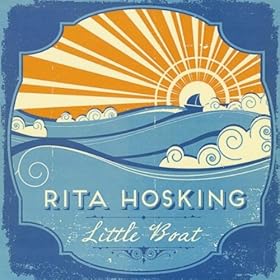|
Jay Aymar, Overtime (independent, 2013) Rita Hosking, Little Boat (independent, 2013) Jay Aymar and Rita Hosking separately wrote two of the most impressive songs I've heard in the last few years. Aymar's "My Cherry Colored Rose" is an extraordinary imagining of a stranger's grief (in this case Canadian hockey announcer Don Cherry's on the occasion of his wife's death). The song is so far removed from the ordinary, so devoid of anything cliched or predictable, that Ian Tyson, who practically never cuts other writers' songs, was moved to cover it. I first heard Tyson's version (on his Yellowhead to Yellowstone, reviewed here on 28 March 2009) and only later caught up with Aymar's. Hosking composed "Ballad for the Gulf of Mexico," for which the designation "protest song" -- though that is indeed what it is -- hardly approaches what it does with lyric, melody and moral force. The Toronto-based Aymar and his band travel the highways that crisscross Canada, playing clubs and festivals and releasing a new album every couple of years or so. Overtime, with its unvarnished acoustic textures, is no stylistic departure, nor does it need to be, but it does serve as testament to a conscientious craftsman who seeks to fashion ever better songs. Aymar stands very much in the tradition (if that's the word) of mid-1960s folksinger-songwriters such as Eric Andersen, Phil Ochs and Tom Paxton. None invented the idea that an acoustic guitarist can make up and sing only his or her own songs (the white performer Blind Alfred Reed and innumerable African American bluesmen and -women were doing that in the 1920s), but Aymar's roots can be located in the moment somebody thought to call such practitioners "singer-songwriters." Actually, it's possible to think of "What a Dream" as Andersenesque or "Your Precious War" as Ochsesque or "I'll Leave When I'm Ready to Go" as Paxtonesque. That says nothing about their quality, of course; what matters is that these are all deftly shaped songs. "What a Dream" turns out to be, in my judgment anyway, Aymar's most riveting piece since "Rose" even while it is not at all like it. "Dream" works on multiple levels, the most immediate of them in conjuring vivid images of the balladeer as wounded romantic and gallant warrior-poet. It, or something much like it, could have fit easily on an early Andersen Vanguard record. If Andersen himself never got around to writing it, Aymar did, and anybody who hears Overtime will thank him for it. At seven cuts and 27 minutes, Hosking's Little Boat is an EP, not a full-bodied CD. For some reason brief extended-play discs are showing up in my mail with increasing frequency. Some performers run out of energy even in that modest space, but Hosking is not among them, which makes the brevity of the new release something of a disappointment. One has the sense that she's just getting warmed up. Still, to paraphrase Donald Rumsfeld, we listen to the disc we have, not to the one we wish we had.
Thematically, the album appears mostly to take its inspiration from family outings in natural landscapes, not necessarily the most encouraging premise, especially since the songs are delivered without irony or humor, in contrast to the way the McGarrigles, who could make it deadly nasty, would have handled such material. This family is happy and close. "Sierra Bound," for example, does not evoke some lonesome rambler heading for the mountains but an anticipated vacation. Even so, the songs manage to avoid being precious or dumb. The worst that can be said is that on one occasion, "Where Time is Reigning" -- about life, the universe and everything -- Hosking may be overreaching, albeit without embarrassing herself. In terms of sheer beauty, "Blow Northwest Wind" is, I think, the outstanding cut. But the toughest, uncompromising number is "Clean," which opens with this brilliant line: "I am a married maid...." It recalls the strengths of her previous release (Burn, which I reviewed here on 19 November 2011), in its ability to relate a compelling narrative from the point of view of someone employed in tedious down-scale labor. Another labor-focused song, "Five Star Location," addresses working-class economic struggle in an era when corporations maintain a stranglehold on all our lives. While its sentiments are admirable, they're set to a surprisingly-for-Hosking pedestrian melody. In any event, as I had occasion to observe last time I wrote about it, her music contains nothing at all of Los Angeles gloss and attitude. Hosking lives in another California entirely, one defined by blue collars and open spaces. Whatever she chooses to sing about, grim or sweet, you can count on one thing: the song will be honest and true. 
|
 Rambles.NET music review by Jerome Clark 8 June 2013 Agree? Disagree? Send us your opinions!  Click on a cover image to make a selection. 



 |

